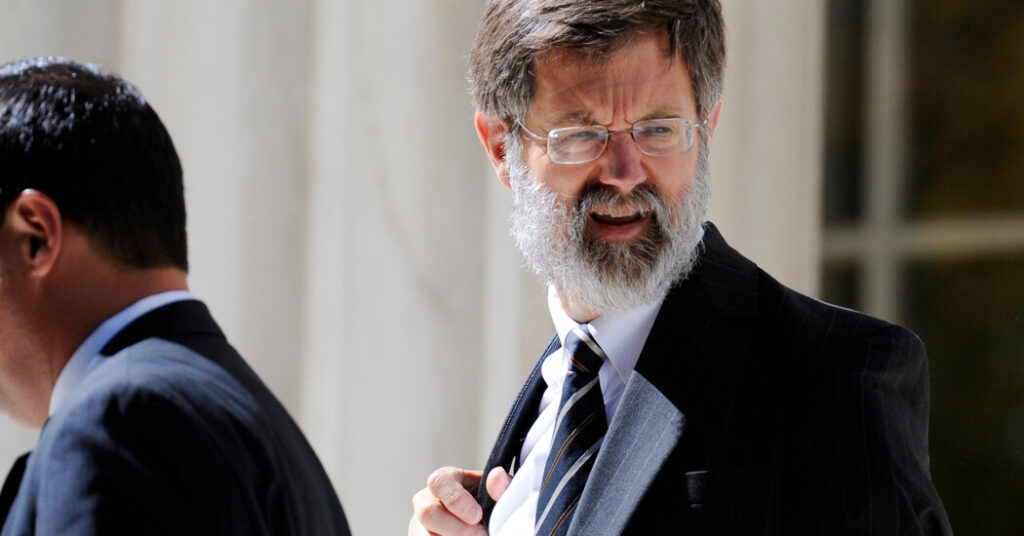After a routine Supreme Court argument on Wednesday, Chief Justice John G. Roberts Jr. asked the lawyer who had represented the government to return to the lectern.
“You have just presented your 160th argument before this court, and I understand it is intended to be your last,” the chief justice told the lawyer, Edwin S. Kneedler, who is retiring as a deputy solicitor general. “That is the record for modern times.”
Chief Justice Roberts talked a little more, with affection and high praise, thanking Mr. Kneedler for his “extraordinary care and professionalism.”
Then something remarkable happened. Applause burst out in the courtroom, and that led to a standing ovation for Mr. Kneedler, with the justices joining, too.
“It was a rare moment of unanimity and spontaneous joy from all nine justices on the bench,” said Richard Lazarus, a law professor at Harvard. “They were all beaming.”
Kannon Shanmugam, a veteran Supreme Court lawyer, said it was “one of the most electric moments I’ve ever seen in the courtroom.”
The tribute to Mr. Kneedler’s candor and integrity came against the backdrop of a different kind of courtroom behavior. In the early months of the second Trump administration, its lawyers have been accused of gamesmanship, dishonesty and defiance, and have been fired for providing frank answers to judges.
Mr. Kneedler presented a different model, former colleagues said.
“Ed is the embodiment of the government lawyer ideal — one whose duty of candor to the court and interest in doing justice, not just winning a case, always carried the day,” said Gregory G. Garre, who served as solicitor general under President George W. Bush.
Mr. Shanmugam said Mr. Kneedler’s loyalty was to the rule of law. “He would much rather get the law right at the risk of losing,” Mr. Shanmugam said, “than win at the cost of misrepresenting the law.”
Seth P. Waxman, who was solicitor general in the Clinton administration, said Mr. Kneedler was the opposite of a partisan.
“In all the years that I worked with Ed in the Justice Department, I did not know his politics,” Mr. Waxman said.
Mr. Kneedler joined the Office of the Solicitor General, the elite unit of the Justice Department that represents the federal government in the Supreme Court, in 1979, served in many administrations and helped tutor the solicitors general who came and went.
“I was incredibly lucky to have Ed as a deputy when I was S.G.,” Justice Elena Kagan, who served as solicitor general in the Obama administration, said in a statement. “There’s pretty much no legal question he can’t answer. And he has a bone-deep understanding of the traditions and ethos of the S.G.’s office.”
She added: “I learned from him every day, and I did my job far better because he was there. In all the time I’ve spent in government, I’ve never known a finer public servant.”
That was something like a consensus view among former solicitors general. Mr. Waxman, for instance, called Mr. Kneedler “a national treasure.”
Noel J. Francisco, the solicitor general in the first Trump administration, said that Mr. Kneedler was “not just a font of knowledge, but of wisdom.”
Elizabeth B. Prelogar, the solicitor general in the Biden administration, said that “Ed Kneedler represents the very best of what it means to be a lawyer for the United States.”
Mr. Kneedler’s retirement is part of a wave of departures from the solicitor general’s office, which is quite small. After the solicitor general and a handful of deputies, there are just 16 line lawyers. About half of them are leaving, The Washington Post reported this month.
Mr. Kneedler, 79, did not respond to requests for an interview. When he received an award this month from the University of Virginia’s law school, his alma mater, he said he was “a career civil servant, not in the press if I can avoid it.”
At the ceremony, Mr. Kneedler gave extended remarks, making points that in another era might have seemed unremarkable. These days, they verged on provocative.
Calling himself a “citizen lawyer,” he praised the many federal employees he had worked with, saying he had been impressed by their “compassion and understanding for our country, and dedication to our country.”
He said his office analyzed legal issues with rigor and care, at least in cases on the court’s regular docket. Since Mr. Trump took office in January, the government has filed a torrent of emergency applications on what critics call the court’s shadow docket.
“When we don’t have emergencies like we have a number of now,” Mr. Kneedler said, “we have a very structured decision-making process.”
Leslie Kendrick, the Virginia law school’s dean, asked Mr. Kneedler a few questions, one of which was premised on his office’s “commitment to providing nonpartisan representation for the United States, regardless of cause, regardless of the political leadership of the other two branches.”
Mr. Kneedler did not quite adopt the premise. “We are lawyers for the United States,” he said, “and the administration in office is the ultimate determiner of what the interests of the United States are.”
But he ended his remarks on a hopeful note. “We’re all part of a process that is leading us to a more perfect union,” he said, “which means a union in which we are coming together, not apart.”
Before the standing ovation at the Supreme Court on Wednesday, Chief Justice Roberts, himself a veteran of the solicitor general’s office, added what he called a personal note as he spoke to Mr. Kneedler.
“I recall that on two occasions you and I argued on the same side here, me representing a private client and you the United States,” the chief justice said. “We lost each of those cases. I’m sure it was my fault. Mr. Kneedler, thank you for your outstanding service to court and country.”


